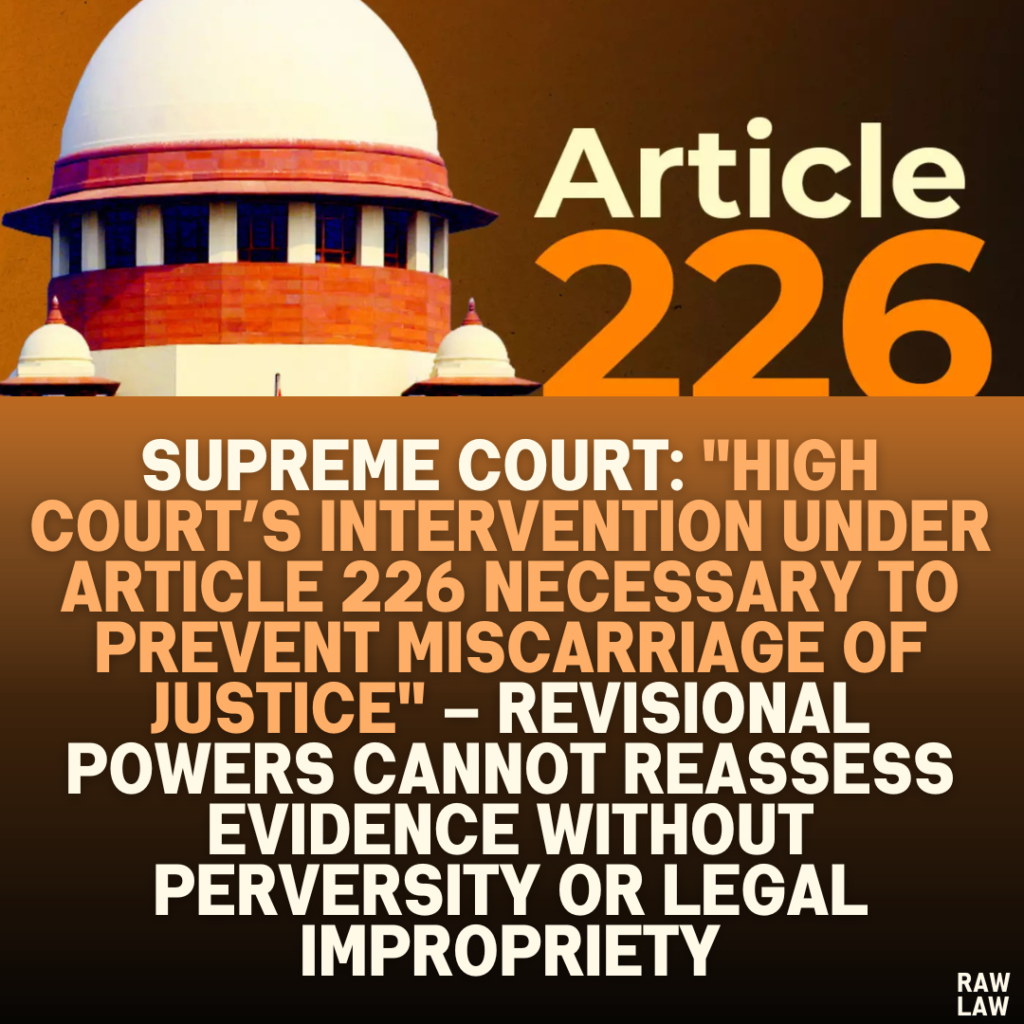Court’s Decision
The Supreme Court upheld the High Court’s decision to set aside the findings of the Appellate and Revisional Authorities, dismissing the appeal. The Court clarified that findings by lower authorities were “perverse,” lacked evidentiary support, and misapplied legal standards. It ruled that the High Court acted correctly in exercising its powers under Article 226 of the Constitution to correct these errors. The Court emphasized that the revisional powers under Section 48 of the U.P. Consolidation of Holdings Act cannot be used to reassess evidence unless the findings are perverse or legally unsound.
Facts
- The case involved Khata Nos. 38 and 193, located in Deoria district.
- The disputed land was initially recorded in the names of Jhagru and Bhusal (sons of Sehati) and Ram Kirpal.
- Gulabi claimed to be the daughter of Aftee (who died in 1959) and sought co-tenancy rights over the land during consolidation operations in 1973.
- The Consolidation Officer dismissed her objections, holding that Gulabi had failed to prove her claim of being Aftee’s daughter and that the land had been in the respondents’ possession for 16 years.
- However, the Appellate and Revisional Authorities reversed the Consolidation Officer’s decision, finding in Gulabi’s favor.
- The High Court later overturned the findings of the Appellate and Revisional Authorities, reinstating the Consolidation Officer’s original decision.
Issues
- Was the High Court justified in overturning the Appellate and Revisional Authorities’ findings?
- Were the findings of the Appellate and Revisional Authorities legally and evidentially supported?
- Did Gulabi successfully prove her claim of paternity and co-tenancy?
- What is the scope of revisional powers under Section 48 of the U.P. Consolidation of Holdings Act, 1953?
Petitioner’s Arguments
- The appellant argued that the High Court erred in dismissing the findings of the Revisional and Appellate Authorities, which were based on their appreciation of evidence.
- They contended that the High Court improperly intervened in findings of fact and overstepped its jurisdiction under Article 226 of the Constitution.
Respondent’s Arguments
- The respondents countered that the Revisional and Appellate Authorities misapplied the law and overturned the Consolidation Officer’s well-reasoned findings without proper evidence.
- They emphasized that the High Court’s intervention was necessary to correct errors of law and prevent miscarriage of justice.
Analysis of the Law
- Section 48 of the U.P. Consolidation of Holdings Act, 1953:
- This section empowers the Director of Consolidation to revise subordinate authorities’ decisions only to correct errors in legality, propriety, or regularity of proceedings.
- Revisional powers do not permit reassessment of evidence unless findings are perverse or unsupported by law.
- Indian Evidence Act, 1872 (Section 101):
- The burden of proof lies on the person asserting a fact. Here, Gulabi was required to prove her claim of paternity and co-tenancy.
- Delay and Laches:
- The mutation order of 1959 was not challenged until 1973, a delay of 14 years, which the Court found unjustified and indicative of laches.
Precedent Analysis
- Ram Dular v. Dy. Director of Consolidation:
- Revisional authorities cannot reassess evidence but must limit their inquiry to whether findings are supported by legally admissible evidence.
- Tukaram Kana Joshi v. Maharashtra Industrial Development Corporation:
- Delays in filing claims can justify denial of relief unless compelling reasons exist.
- State of H.P. v. Rajkumar Brijender Singh:
- Unreasonable delay in exercising suo motu powers can invalidate proceedings.
- Ram Avadh v. Ram Das:
- Courts must evaluate whether findings of fact are rooted in admissible evidence and not tainted by procedural errors.
Court’s Reasoning
- Findings of the Consolidation Officer:
- The officer dismissed Gulabi’s claim based on insufficient evidence, noting that her oral testimony and the birth register lacked credibility.
- The officer found that the respondents had been in possession of the land for 16 years, disproving Gulabi’s claim.
- Reversal by Appellate and Revisional Authorities:
- The Appellate and Revisional Authorities’ findings were deemed perverse by the High Court because they ignored significant evidence and legal principles.
- Role of the High Court:
- The High Court correctly identified errors in the lower authorities’ findings and restored the Consolidation Officer’s decision.
- Supreme Court’s Observations:
- The Court found no fault with the High Court’s reasoning, affirming that revisional powers cannot be used to reassess evidence in the absence of perversity or legal impropriety.
Conclusion
The Supreme Court dismissed the appeal, confirming the High Court’s decision to reinstate the Consolidation Officer’s findings. The Court emphasized the necessity of credible evidence and timely claims in land disputes.
Implications
- The judgment reinforces the limitations on revisional powers under Section 48 of the U.P. Consolidation of Holdings Act, emphasizing the need for findings to be rooted in admissible evidence.
- It underscores the importance of timely challenges to administrative orders, as unexplained delays can weaken claims.
- The decision affirms the principle that courts should not reappreciate evidence unless findings are demonstrably perverse or unsupported by law.




Pingback: Supreme Court Upholds Traditional Marumakkathayam Law of Kerala: Dispute over Tharwad Properties Resolved, with Property Inherited by Female and Her Children Determined to Retain its Character as Tharwad Property. - Raw Law